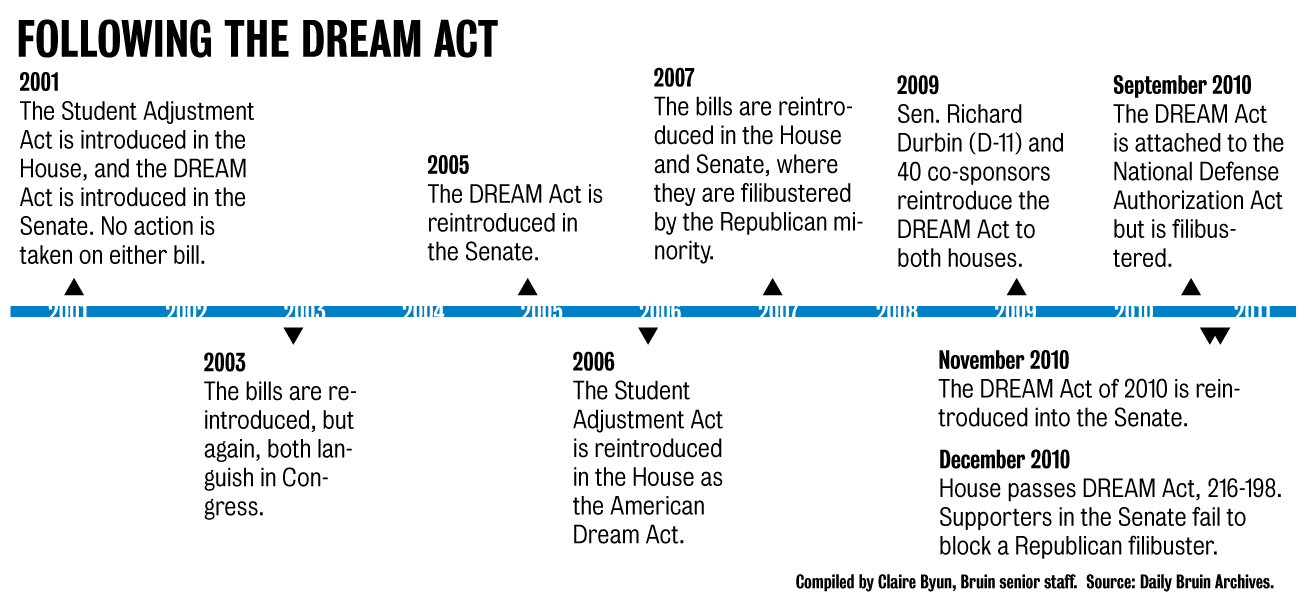The Development, Relief and Education for Alien Minors Act, shut down last December by a 55-41 vote in the U.S. Senate, had been a possible path to citizenship for thousands of undocumented students.
While most Republicans opposed the idea of providing federal aid to undocumented students, the bigger issue for opponents proved to be the question of granting amnesty to illegal immigrants.
“Although (opponents) sympathize with the individuals, they view the act as a form of amnesty that will only create a stronger incentive for people to enter the country illegally,” said Mark Peterson, a professor of public policy and political science at UCLA.
The DREAM Act would provide federal financial aid, grants, loans and work study programs to undocumented students who are enrolled in college. It would also grant citizenship to those who complete college or serve in the military.
Age was an important factor in fostering opposition to the bill, said Bob Dane, press secretary and director of communications for the Federation for American Immigration Reform.
Of the three forms of the DREAM Act bill presented in the House of Representatives last year, one had no age limit specified for those who would benefit from the DREAM Act and the other specified an age limit of 30. The latter bill eventually passed in the House, 216-198.
“Given that the majority of illegal aliens are under the age of 35, this was a very old and transparent attempt to piecemeal amnesty as an educational initiative,” Dane said.
While supporters believe the bill would help undocumented students become contributing members of the workforce, the opposition believes passing the act would translate to rewarding criminal activity.
“It encourages lawbreaking,” Dane said. “It’s fundamentally unfair to those who do come here legally.”
For Lydia Mazuryk, a third-year history student and chairwoman of Bruin Republicans, the act is not the best way to approach immigration reform because it ignores the immigration laws that currently exist.
“America has to appreciate immigrants … but the most important thing is to remember that we are ruled by the law,” she said. “Keeping this rule of law in mind, you need to uphold what that means in every aspect of society, which includes immigration.”
Some supporters of the DREAM Act argue that most people who would be affected were children when they came to the U.S. and had little control in breaking the immigration laws. Rather, it was their parents who actively made the decision to move to the U.S.
But opponents say they take this scenario into consideration.
“We’re not punishing the children for the illegal acts of the parents,” Dane said. “We’re simply not rewarding them for the illegal acts of the parents.”
Moreover, Peterson said opponents argue that providing citizenship to undocumented students would potentially make it easier for their parents to gain citizenship rights because their children are documented.
“If kids can become citizens, then ultimately the children can petition for their parents to get into the country or become citizens,” he said.
Dane likens this scenario to a never-ending cycle of backdoor chain migration, indicating it would foster a stronger incentive to enter the U.S. illegally.
Between opponents of the DREAM Act, disagreements over reasons for contesting the act often arise. Mazuryk said, however, she feels the act is currently not the right path for the country to take because it provides for a blanket amnesty that is not lawful.
“Love immigration and immigrants, but do it legally and we won’t have a problem,” she said.
